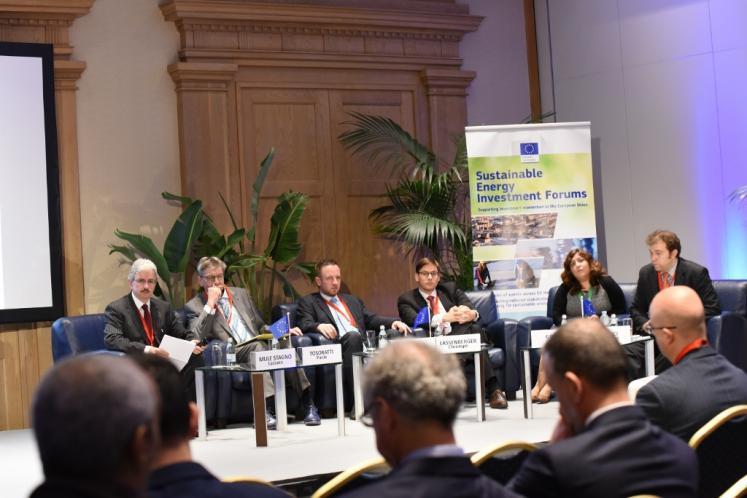Discussing Finance - Financing Energy Efficiency in Malta and Italy

The Sustainable Energy Investment Forums are a series of workshops and seminars, organised under a contract managed by the European Commission’s Executive Agency for SMEs (EASME). On 22 November 2018 a ‘Financing Energy Efficiency in Malta and Italy’ event was organised in partnership with the Maltese Ministry for Energy and Water Management, the Ministry of Transport, Infrastructure and Capital Projects of Malta and the UN Environment Programme Finance Initiative (UNEP FI).
The forum featured 60 participants from a wide variety of sectors including national and local governments, industry associations, building professionals and the banking and financial sector. During his welcome speech Ian Borg, Malta’s Minister of Transport, Infrastructure and Capital Projects, announced the creation of a new authority for construction and buildings. The authority will consolidate legislation, regulate construction and monitor the correct application of rules. Public and blended financing for energy efficiency will be part of its competences. The opening plenary session covered the current European and national policy contexts. Paolo Tosoratti (European Commission DG Energy), presented the European policy framework in support of energy efficiency investments; Ecodesign and Energy Labelling, the Energy Performance of Buildings Directive, and the Energy Efficiency Directive.
Martin Schönberg (UNEP FI) outlined what is being done globally to mobilise the financial sector on energy efficiency. He compared the energy efficiency market with the renewables market, highlighting that the energy efficiency market faces four main challenges when it comes to scaling up, that is; its complexity and the wide range of financing structures necessary for investments across sectors and asset classes, deal size which often requires small deals to be aggregated, the fact that most energy efficiency transactions are in fact embedded transactions in other transactions (such as real estate refinancing), and coordination where a common framework for project developers, investors, financiers and project hosts needs to be created.
Christoph Lassenberger (European Investment Bank) gave examples of EU initiatives, notably Smart Finance for Smart Buildings (SFSB). Daniela Grech (Maltese Ministry of European Affairs), shared the results of the ex-ante assessment undertaken before Malta’s application for a SFSB financial instrument at the EIB, giving insights into energy market failures and funding opportunities. Alessandro Federici, ENEA, presented how Italy used the white certificate schemes to encourage the development of an ESCO market and Italy’s success stories of tax deductions for energy efficiency investments.
Following this, breakaway sessions took place. The two parallel sessions before lunch covered aspects related to making energy efficiency attractive to the financial sector, and the renovation of public buildings. The EEFIG Underwriting Toolkit and the De-Risking Energy Efficiency Platform (DEEP) were presented by Mark Scicluna Bartoli, Bank of Valletta, followed by an overview of renovation financing in Italy presented by Angelo Peppetti, Italian Banking Association (ABI). Dario di Santo, FIRE, explained how the renovation of some public buildings is made through energy performance contracting in Italy. The main challenges in Malta, including the absence of ESCOs and accredited energy managers, were presented by Diane Cassar, Malta Intelligent Energy Management Agency (MIEMA). Norman Zammit, President of the Chamber of Engineers of Malta, concluded with thoughts of how to develop a market for ESCOs in Malta.
The two afternoon sessions addressed home renovation, and the energy efficiency of industry and SMEs. Vincent Buhagiar, Faculty for the Built Environment at University of Malta, gave an overview of the energy performance of the housing stock in Malta, followed by a bank experience on home renovation loans presented by Edward Grech, Bank of Valletta. Marco Devetta, Sogesca, shared his experience on a one-stop-shop for home renovation in Padova, focusing on the barriers they encountered and the solutions identified. The session on industry and SMEs was moderated by Charles Buttigieg, Malta Water and Energy Agency. Rene Saliba, CEO of the Malta Development Bank, presented the financing opportunities in energy efficiency they offer to industry and SMEs. Karl Herrera, Malta Enterprise, outlined the schemes offered to micro-enterprises and SMEs, explaining their limited uptake and the challenges in encouraging the implementation of energy audits recommendations from SMEs. A perspective from business on how to support investment in energy efficiency was given by Geoffrey Saliba, Malta Business Bureau. It was argued that the higher the economic activity of industry and SMEs, the less inclined towards energy efficiency projects they were, favouring instead an outward looking approach towards increasing sales.
In the closing plenary session the key points of the day were summarised, highlighting that for energy efficiency to be high on Malta’s agenda the efforts of the new authority for construction and buildings will need to focus on awareness raising, blending of finance and harmonised legislation.
All the presentations from the event can be found here. Other regional events have been taking place regularly, for example Financing Energy Efficiency in Germany, France and Austria on 5 December 2018 in Frankfurt. A webinar on supporting energy efficiency in SMEs and industry took place on 13 December. For further background information on the Sustainable Energy Investment Forums project and to see the agenda and presentations from previous and upcoming events, please visit this webpage.
By Prof. Dr. Simon Paul Borg, University of Malta
News published on Build Up News
Consult the source



